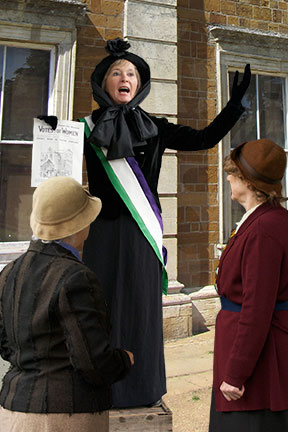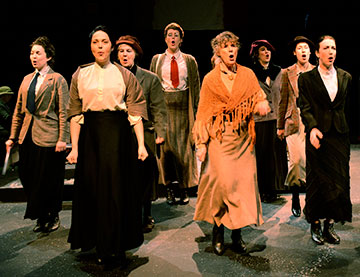
and Frances Herzer
Credit: Nancy Caldwell
At the Jericho Arts Centre until January 12
604-224-8007/www.vitalsparktheatre.com
Posted January 5, 2014
Thanks to director/creator Joan Bryans, I will never enter a polling booth again without thinking of Emmeline Pankhurst (1858-1928), leader of the British suffragette movement back in the early days of the 20th century. It’s easy to forget how these courageous activists paved the way for the rest of us. The excruciating re-enactment in Rebel Women of the forced feeding of the jailed members of the Women’s Social and Political Union (WSPU) will make it impossible for me to pass up the hard-won privilege of voting even if ‘none of the above’ is how I would like to mark my ballot.
Before Rebel Women, I imagined the suffragettes (a term coined by a derisive London News journalist) in elegant Edwardian garb, chaining themselves – but in a ladylike way – to doors and railings. But when those non-militant tactics failed to achieve the WSPU’s goals, Pankhurst endorsed all-out war: smashing of windows, arson, property damage, and bombings. Imagine the furor when Emily Davison died whilst attempting to pin a banner – Vote for Women – on King George V’s horse at the Epsom Derby in June of 1913.

Over a thousand women were imprisoned beginning with Emmeline Pankhurst’s daughter Christabel (Lindsay Nelson) and Annie Kenney (Barbara Kozicki). Denied designation as political prisoners, the women began hunger strikes which resulted in forced feeding. “The process of tube feeding was strenuous; without the consent of the hunger strikers, they were typically strapped down and forced to eat via stomach or nostril tube, often with a considerable amount of force. Many women found the process painful, and after the practice was observed and studied by several physicians, it was deemed to have both short-term damage to the circulatory system, digestive system and nervous system and long term damage to the physical and mental health of the suffragettes.” (Source: Wikipedia).
Interesting and surprising was the number of men who supported the suffragettes; unfortunately, for a long time, this number did not include politicians who had the power to introduce and pass bills in Parliament. And there were betrayals along the way – prime ministers who promised the vote but reneged – and disappointments – the 1918 Representation of the People Act that gave the vote only to women over the age of 30. Finally, and it’s a glorious moment in Rebel Women, in 1928 the Representation of the People (Equal Franchise) Act was passed and women were eligible to vote on the same terms as men. New Zealand, incidentally, gave women the vote in 1893. Full suffrage to First Nations men and women in Canada was not won until 1960.

Sarah Ripplinger and Kayla Bigras
Credit: Nancy Caldwell
Director/creator Bryans has, wherever possible, used the actual words of actual historical figures including Helena Gutteridge (Sarah Ripplinger) who left England for Canada in 1912 and carried on the fight in our country. At the piano, Pat Unruh plays familiar tunes to which the suffragettes set new lyrics and which the ensemble enthusiastically sings. The music and the staging on Sean Malmas’s spare set lifts what could be simple reenactment of history or docudrama into the realm of the theatrical.
In the role of Emmeline Pankhurst, Barbara Ellison is the focal point around which the large cast of women (11) and men (4) plays out the story. Diminutive but feisty, Ellison’s earnesteness rivals Pankhurst’s own. Rebel Women is an earnest play: the fight was tough and demanded the kind of dedication that Ellison brings to the role.
The story goes that little Emmeline Pankhurst, feigning sleep when her father came into her bedroom to tuck her in, heard her father say, “What a pity she wasn’t born a lad.” It’s a damn good thing she wasn’t or women might still be throwing themselves under racehorses and going on hunger strikes. Vital Spark, Bryans’ theatre company – strikes sparks again.

